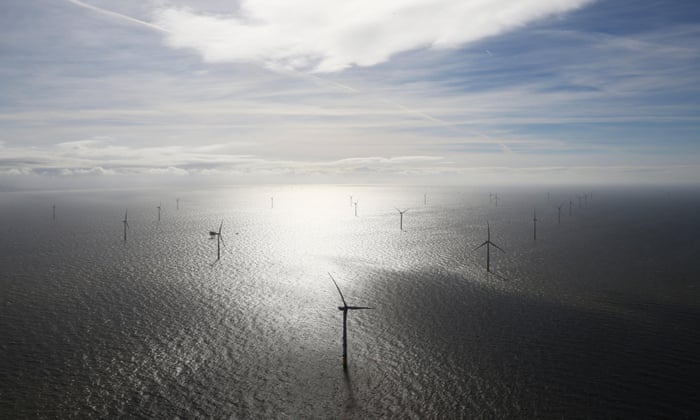
Dong Energy’s Burbo Bank Extension windfarm, off Liverpool Bay. Dong has completed its plan to quit oil and gas. Photograph: Dong Energy/PA
Anglo-Swiss chemicals firm Ineos has bought the oil and gas business of Dong Energy for £1bn, a major milestone in the Danish company’s switch from hydrocarbons to renewable energy.
The acquisition is the latest in a buying spree by Ineos, which recently bought a significant North Sea oil pipeline for £200m from BP, and takes it from 28th biggest oil and gas producer in the region to the top 10.
The move highlights two sharply contrasting strategies for Europe’s energy companies: a doubling-down on fossil fuels or shifting exclusively to focus on clean energy.
Ineos, which is funding the purchase through cash flow from its existing businesses including the Grangemouth refinery in Scotland, said the acquisition was a “very logical” step.
“It builds on what we’ve got. It brings us to a much bigger scale – 100,000-plus barrels a day,” said Geir Tuft, a senior executive at Ineos, which also increased its shale gas acreage in the UK by a tenth in March.
He said the company was sanguine about the relatively low oil price of about $50 a barrel, as it would keep costs low.
Tuft said the Dong deal, which was higher than analysts’ valuations, reflected the companies’ differing strategies. “We’re of the opinion that hydrocarbons, and gas in particular, are still a significant part of the energy equation for the world for many years to come.” Around 440 Dong staff will transfer to Ineos.
State-owned Dong, named after its origins as the Danish Oil and Natural Gas company, has now completed its plan of quitting oil and gas, which it first announced last November.
When the sale completes in the third quarter, Dong will be left to focus on its core business of developing and selling windfarms, such as the one it recently built off the Liverpool coast using the world’s biggest turbines.
Henrik Poulsen, the company’s chief executive, said: “The transaction completes the transformation of Dong Energy into a leading pure play renewables company.”
The proceeds of the sale will go towards the six offshore windfarms the company is currently building. The company still has coal assets which it plans to divest.
The move out of fossil fuels is one several major European energy companies are currently pursuing, such as France’s Engie, which plans to earn 90% of its earnings before tax and interest from low carbon businesses by 2019.
Experts at asset management firm Bernstein said the sale had fetched an attractive price for Dong, which floated on the stock market last year for £10bn.
Andrew Grant, of the UK-based thinktank Carbon Tracker, said: “There isn’t a one-size fits all conclusion for fossil fuel companies concerned about future demand. Some, like Dong, will be able to rebalance their portfolios into other assets like renewables.
“However, not all energy companies will feel their skills translate to low-carbon energy sources, but they can still deliver good results with a disciplined approach of focussing only on the lowest-cost oil and gas projects and returning excess cash to shareholders.”
[“Source-ndtv”]




